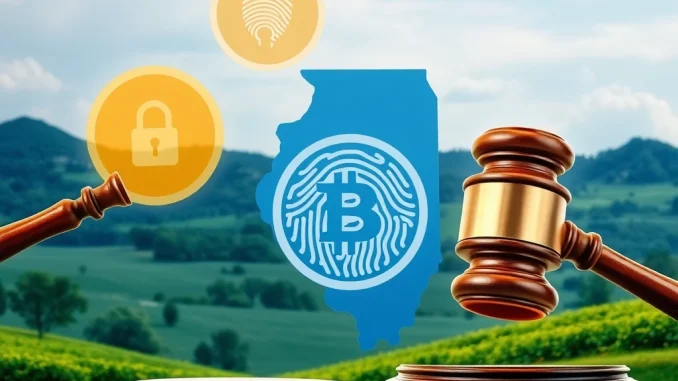
Crypto users are often focused on the security of their digital assets, but what about the privacy of their personal information? A significant development is unfolding for one of the largest exchanges: a Coinbase lawsuit has been filed, raising critical questions about how user data is handled, specifically regarding biometric data privacy.
What is the Illinois BIPA Law and Why is it Relevant?
The lawsuit against Coinbase centers on alleged violations of the Illinois BIPA (Biometric Information Privacy Act). This state law is known for its strict requirements regarding the collection, use, and storage of biometric identifiers like fingerprints, voiceprints, retinal scans, and facial geometry. Unlike many other state privacy laws, BIPA allows private citizens to sue companies for violations, which can result in significant penalties per violation.
The Core Allegations in the Crypto Privacy Lawsuit
According to reports, the class-action lawsuit claims that Coinbase requires users to verify their identity as part of its Know Your Customer (KYC) procedures. This involves submitting a government-issued ID and a selfie. The key allegations are:
- Coinbase allegedly uses third-party facial recognition software to process this data.
- The exchange reportedly failed to provide users with written notice about the collection, storage, and use of their biometric data as required by BIPA.
- Crucially, the lawsuit claims Coinbase did not obtain proper informed consent from users before collecting and processing this sensitive information.
- The suit also questions the exchange’s practices regarding the sharing of this data with third parties and its retention policy.
Understanding Coinbase’s Privacy Policy in Light of the Suit
This legal challenge brings the spotlight directly onto the Coinbase privacy policy and its compliance with state-specific regulations like BIPA. While exchanges collect data for regulatory compliance (like KYC/AML), laws like BIPA dictate *how* certain types of data, particularly biometrics, must be handled. The lawsuit suggests a potential disconnect between Coinbase’s procedures and BIPA’s stringent consent and notification requirements.
What Could This Coinbase Lawsuit Mean for Users and the Exchange?
A class-action lawsuit under BIPA can have significant implications. If successful, Coinbase could face substantial financial penalties, potentially totaling millions depending on the number of affected users and the nature of the violations. Beyond the financial cost, such a lawsuit can impact user trust and potentially lead to changes in how crypto exchanges handle identity verification and biometric data privacy moving forward. It serves as a stark reminder that crypto companies must navigate not only financial regulations but also evolving data privacy laws across different jurisdictions.
This case is still developing, and the outcome remains to be seen. However, it highlights the increasing scrutiny on how tech companies, including those in the crypto space, manage user data, especially sensitive biometric information. Stay tuned for updates on this critical legal challenge facing Coinbase in Illinois.



